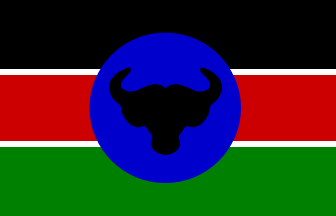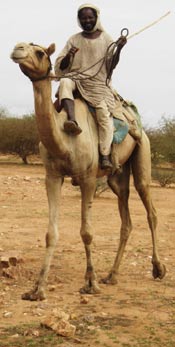|
Popular Defence Forces
The Popular Defense Forces (PDF, ar, قوات الدفاع الشعبي) was a paramilitary force established under the Popular Defense Forces Act of 1989, it was also part of the Sudanese Armed Forces before its dissolution in 2019 following the overthrow of Omar al-Bashir. The force had close links with the National Islamic Front associated with former president Omar al-Bashir, and was originally formed as a dedicated Islamist militia. In 2015, the PDF largely operated as a reserve force for the Sudanese Armed Forces. Upon its foundation in 1989, several tribal militias throughout Sudan were integrated into the PDF, including the Messiria tribe's ''murahiliin'', the Rizeigat tribe's ''fursan'', and the Fertit Army of Peace. In 2004, the Federal Research Division of the Library of Congress estimated that the Popular Defence Forces consisted of 10,000 active members, with 85,000 reserves. It had been deployed alongside regular army units against various rebel groups. In 2020, ... [...More Info...] [...Related Items...] OR: [Wikipedia] [Google] [Baidu] |
National Congress (Sudan)
The National Congress Party (NCP; ar, المؤتمر الوطني, ') was a major political party that dominated domestic politics in Sudan from its foundation until the Sudanese Revolution. After the split of the National Islamic Front (NIF), the party was divided into two parties. The Islamic Movement led by its secretary Hassan al-Turabi and the military commanded by Omar al-Bashir launched a military coup against Prime Minister Sadiq al-Mahdi and President Ahmed al-Mirghani in 1989. Omar al-Bashir, who also became president of the National Congress Party and Sudan, seized power and began institutionalising Sharia at a national level. After a military coup in 1969, Sudanese President Gaafar Nimeiry abolished all other political parties, effectively dissolving the Islamic parties. Following political transition in 1985, Turabi reorganised the former party into the National Islamic Front (NIF), which pushed for an Islamist constitution. The NIF ultimately backed anothe ... [...More Info...] [...Related Items...] OR: [Wikipedia] [Google] [Baidu] |
National Islamic Front
The National Islamic Front ( ar, الجبهة الإسلامية القومية; transliterated: ''al-Jabhah al-Islamiyah al-Qawmiyah'') was an Islamist political organization founded in 1976 and led by Dr. Hassan al-Turabi that influenced the Sudanese government starting in 1979, and dominated it from 1989 to the late 1990s. It was one of only two Islamic revival movements to secure political power in the 20th century (the other being the followers of Ayatollah Ruhollah Khomeini in the Islamic Republic of Iran). The NIF emerged from Muslim student groups that first began organizing in the universities during the 1940s, and its main support base has remained the college educated. It supported the maintenance of an Islamic state run on sharia and rejected the concept of a secular state. It took a "top down" or "Islamisation from above" approach of "infiltrating Sudan's state apparatus, army, and financial system". Kepel, ''Jihad'', 2002: p.177 It demonstrated itself to be both ... [...More Info...] [...Related Items...] OR: [Wikipedia] [Google] [Baidu] |
Second Sudanese Civil War
The Second Sudanese Civil War was a conflict from 1983 to 2005 between the central Sudanese government and the Sudan People's Liberation Army. It was largely a continuation of the First Sudanese Civil War of 1955 to 1972. Although it originated in southern Sudan, the civil war spread to the Nuba mountains and the Blue Nile. It lasted for 22 years and is one of the longest civil wars on record. The war resulted in the independence of South Sudan six years after the war ended. Roughly two million people died as a result of war, famine and disease caused by the conflict. Four million people in southern Sudan were displaced at least once (and normally repeatedly) during the war. The civilian death toll is one of the highest of any war since World War II and was marked by numerous human rights violations, including slavery and mass killings. Background and causes The Sudanese war is often characterized as a fight between the central government expanding and dominating peoples ... [...More Info...] [...Related Items...] OR: [Wikipedia] [Google] [Baidu] |
War In Darfur
The War in Darfur, also nicknamed the Land Cruiser War, is a major armed conflict in the Darfur region of Sudan that began in February 2003 when the Sudan Liberation Movement (SLM) and the Justice and Equality Movement (JEM) rebel groups began fighting against the government of Sudan, which they accused of oppressing Darfur's non-Arab population. The government responded to attacks by carrying out a campaign of ethnic cleansing against Darfur's non-Arabs. This resulted in the death of hundreds of thousands of civilians and the indictment of Sudan's president, Omar al-Bashir, for genocide, war crimes, and crimes against humanity by the International Criminal Court. One side of the conflict is mainly composed of the Sudanese military, police and the Janjaweed, a Sudanese militia group whose members are mostly recruited among Arabized indigenous Africans and a small number of Bedouin of the northern Rizeigat; the majority of other Arab groups in Darfur remained uninvolved. ... [...More Info...] [...Related Items...] OR: [Wikipedia] [Google] [Baidu] |
Ali Ahmed Karti
Ali Ahmed Karti ( ar, علي أحمد كرتي; born 27 October 1953) is a Sudanese politician. Karti served as Foreign Minister of Sudan from 2010 to 2015. Karti studied law at the University of Khartoum. Karti served as a commander of the Popular Defence Forces The Popular Defense Forces (PDF, ar, قوات الدفاع الشعبي) was a paramilitary force established under the Popular Defense Forces Act of 1989, it was also part of the Sudanese Armed Forces before its dissolution in 2019 following the ... in the 1990s. Karti is also a prominent Sudanese businessman, and previously bought the Friendship Hotel in Khartoum for $85 million. On March 17, 2020, the Sudanese prosecutor's office ordered his arrest for his role in the 1989 coup d'état which brought Omar al-Bashir to power. It said in a statement that his assets would be frozen. References Living people Foreign ministers of Sudan Place of birth missing (living people) University of Khartoum alumni ... [...More Info...] [...Related Items...] OR: [Wikipedia] [Google] [Baidu] |
Sudanese Armed Forces
The Sudanese Armed Forces (SAF; ar, القوات المسلحة السودانية, Al-Quwwat al-Musallaha as-Sudaniyah) are the military forces of the Republic of the Sudan. In 2011, IISS estimated the regular forces' numbers at personnel, while in 2016–2017, the Rapid Support Forces had members participating in the Yemeni Civil War (2015–present), Yemeni Civil War (of which returned to Sudan by October 2019). History The origins of the Sudanese army can be traced to six battalions of black soldiers from southern Sudan, recruited by the British during the Anglo-Egyptian conquest of Sudan, reconquest of Sudan in 1898. Sudan officially became the Anglo-Egyptian Sudan in 1899. The highest-ranking British officer in Egypt, known as the Sirdar (Egypt), Sirdar, also served as List of governors of pre-independence Sudan, Governor General of the Sudan. In 1922, after Egyptian Revolution of 1919, nationalist riots stimulated by Egyptian leader Saad Zaghloul, Egypt was Unilateral ... [...More Info...] [...Related Items...] OR: [Wikipedia] [Google] [Baidu] |
Messiria Tribe
The Messiria (), known also under the name of Misseriya Arabs, are a branch of the Baggara ethnic grouping of Arabs, Arab tribes.Adam, Biraima M. 2012. Baggara of Sudan: Culture and Environment, Amazon online Books''Baggara of Sudan: Culture and Environment''/ref> Their language is the Sudanese Arabic. Numbering over one million, the Baggara are the second largest ethnic group in Western Sudan, extending into Eastern Chad. They are primarily nomadic cattle herders and their journeys are dependent upon the seasons of the year. The use of the term Baggara carries negative connotations as slave raiders, so they prefer to be called instead Messiria. Geography of Messiria Country (Dar Al Messiria) The term ''Dar'' means land or location. The word ''Al'' or ''al'' and sometimes ''El'' or ''el'' corresponds to the definite article ''The'' in English. The term ''Dar Al Messiria'' means ''the land or location of the Messiria''. According to Ian Cunnison 1966,Ian Cunnison, 1966, Bag ... [...More Info...] [...Related Items...] OR: [Wikipedia] [Google] [Baidu] |
Rizeigat Tribe
The Rizeigat, or Rizigat, or Rezeigat (Standard Arabic Rizayqat) are a Muslim and Arab tribe of the nomadic Bedouin Baggara (Standard Arabic Baqqara) people in Sudan's Darfur region. The Rizeigat belong to the greater Baggara Arabs fraternity of Darfur and Kordofan and speak Chadic Arabic. They are primarily nomadic herders and their journeys are dependent upon the seasons of the year. They are a branch of the Juhayna group. They are divided into the Abbala (camel-herding) Rizeigat, who live in northern Darfur and Chad, and the Baggara who inhabit south-east Darfur. In turn they are divided into several large clans, notably the Mahamid, Mahariya and Nawaiba. The ecological differences between the north and south of Sudan allowed for two different types of nomadism to evolve: camel herders in the north and cattle herders in the south. The Baggara Rizeigat backed the Sudanese government during the conflict with the SPLA. They formed the '' Murahileen'', mounted raiders that attack ... [...More Info...] [...Related Items...] OR: [Wikipedia] [Google] [Baidu] |
Dār Fertit
Dār Fertit (also spelled ''Dar Fartit'') is a historical term for the lowlands south of Darfur (Dar Fur) and east of the highlands in the east of the modern-day Central African Republic that contain tributaries of the White Nile River. This region included parts of southwestern Sudan and northwestern South Sudan. In the present era, Fertit is a catch-all word for non-Dinka, non-Arab, non-Luo, non-Fur groups and tribes in Western Bahr el Ghazal, South Sudan. Even though these groups often speak different languages and have a history of inter-tribal violence, they have become more unified over time, mostly out of opposition to the Dinka people. Historically and down to the present, the region has been home to many ethnic groups and languages, some going back before 1800, others having migrated there since then. Dar Fertit has never been a united polity. Until the 1840s it, along with the rest of modern-day South Sudan, was unclaimed by any state, in particular the Muslim sultanates wi ... [...More Info...] [...Related Items...] OR: [Wikipedia] [Google] [Baidu] |
Army Of Peace
The Army of Peace ( ar, جيش السلام, Jaysh al-Salam) was a large alliance of Fertit tribal militias in Western Bahr el Ghazal during the Second Sudanese Civil War. Although initially armed by the Sudanese government in order to fight against South Sudanese separatists, the Army of Peace became especially notorious for massacring Dinka civilians. These mass killings grew so excessive that the group even came into violent conflicts with other pro-government forces. The militia was mostly disbanded in 1988, though a rump faction continued to be active and joined the Popular Defence Forces in 1989, and later the South Sudan Defense Forces (SSDF) in 1997. Name The Arabic name of the militia was ''Jaysh al-Salam'' ( ar, جيش السلام, alternatively transliterated ''Jesh al Salam'') which can be translated "Army of Peace" or "Peace Army". It was also known as "Peace Force" ( ar, links=no, قوات السلام, Quwat al-Salam, alternatively transliterated ''Qwat Salem''), ... [...More Info...] [...Related Items...] OR: [Wikipedia] [Google] [Baidu] |
Federal Research Division
The Federal Research Division (FRD) is the research and analysis unit of the United States Library of Congress. The Federal Research Division provides directed research and analysis on domestic and international subjects to agencies of the United States government, the District of Columbia, and authorized federal contractors. As expert users of the vast English and foreign-language collections of the Library of Congress, the Division's area and subject specialists employ the resources of the world's largest library and other information sources worldwide to produce impartial and comprehensive studies on a cost-recovery basis. The Federal Research Program is run by the Federal Research Division (FRD), the fee-for-service research and analysis unit within the Library of Congress. The Federal Research Program of the Library of Congress was authorized by the United States Congress in accordance with the Library of Congress Fiscal Operations Improvement Act of 2000 (2 U.S.C. 182c). FR ... [...More Info...] [...Related Items...] OR: [Wikipedia] [Google] [Baidu] |




